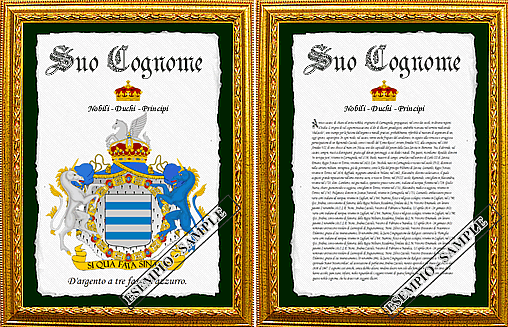Ferracci has a stock in Umbria and one between Roman, frusinate and Latin, Ferraccio, almost unique, would appear to be in the umbromarchigiana area, Ferri is extremely widespread throughout the peninsula, Ferro is present throughout the nation, Ferru is typically Sardinian from Cagliari, Ferrù, is practically unique, Ferrulli.is typically Apulian, of the Bari in particular, and specifically of Altamura and Acquaviva delle Fonti, with good presences also in Gravina di Puglia, Bari and Sant'Eramo in Colle, Ferrullo, much more rare, it is specific of Altamura, all these surnames should derive, directly or through hypochoristic or derogatory, from the medieval name Ferro, attributed to sons to whom the temper and strength of the iron were hoped, or even from nicknames related to work, extraction or iron smelting. additions provided by Stefano Ferrazzi Together with its variants and relative hypocoristic forms, the surname Ferro lends itself at least to two interpretations, which, added together, justify the very high frequency in the whole country. In some cases, in fact, it is possible that these surnames derive from the profession exercised by the progenitors (more probably of the blacksmiths or, in any case, of the ironworkers), if the term iron was used, in a metonymic sense, as a trade name. It must be said, in fact, that the activity of the blacksmith or master ironworker enjoyed a time of great esteem, both for the importance that iron working has assumed in the history of mankind (just think that an entire age, the Age del Ferro, takes its name from this mineral) and because of the wide range of tasks to which blacksmiths were often called (construction of objects for domestic use, architectural works, forging of weapons, etc). Turning now to the second hypothesis (probably the most suitable to explain the frequency and variety of these surnames, especially considering their hypocoristic forms), in many cases Ferro and its variants derive from the medieval name Ferro, which, despite its clear meaning literal, actually lends itself to an ambiguous interpretation. On the one hand, in fact, we can think of a direct connection between the person's name and the metal of the same name, for the same reasons mentioned above (those, that is, related to the importance of iron and its processing): since the time ancient men considered iron a precious mineral, sometimes claiming that it was a gift from the Gods or, in any case, believing in its astral origin, that is due to the fall of meteorites; in this context, moreover, it is interesting to note that the Greek term sideros, that is iron, derives from the same root as the Latin sidus, sideris, meaning star, astro, as if to indicate a celestial or even divine origin for this metal. If this were the case, then the name Ferro would fit into a particular category of medieval names, those taken from the mineral world (just to name a few, Silver, Diamond, Gold, Ruby, Emerald, etc) can be mentioned. Beyond the ancient and medieval symbolism, however, it must be said that the name Ferro could also refer to the qualities most often recognized to this metal, such as hardness, compactness, solidity (to make similarities, just think of old names as Durante, Fermo, Costanzo or, again, the singular Ferrigno). Finally, a last but no less valid interpretation would derive this name not from the homonymous metal, but from the ancient figurative meaning of sword, blade or, in any case, a cutting weapon, which the term iron has often assumed in the past ( as it still appears today from phrases such as crossbars, knitting, putting on fire, etc). If this were the case, then the name Ferro would fit into another category of medieval names, often born in the warrior-chivalric sphere or, in any case, made known by the knightly epic (among the many examples, we can mention Ferracuto, Tagliaferro, Maccaferro, Lancia, Battaglia, Guerra, Guerriero, etc, all quite common names once). In conclusion, therefore, the surname Ferro and its variants derive more often from the surnames of personal names of the founders, although in some cases a derivation from nicknames or trade names is not excluded.
Buy a heraldic document with your coat of arms
Verba Volant, Scripta Manent
